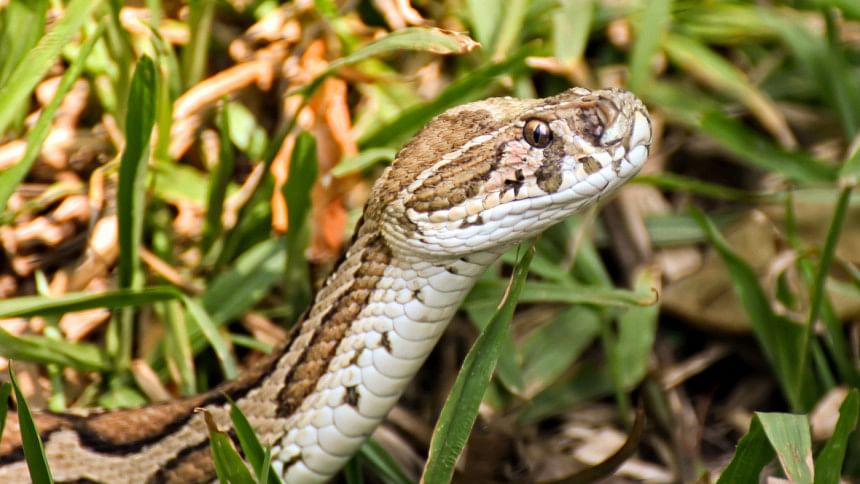What to do when you encounter a Russell's Viper

Amid growing concerns over the recent sightings of Russell's Viper (Chandrabora) in various parts of the country, the Ministry of Environment, Forest, and Climate Change has issued guidelines to ensure public safety and welfare.
Understanding the Russell's Viper threat
While the presence of Russell's Vipers is alarming, it is essential to note that human encounters with these snakes are unlikely. These snakes typically inhabit lowland grasslands, thickets, open forests, and agricultural areas, avoiding human settlements.
Their earth-colored bodies allow them to blend seamlessly with the ground, increasing the risk of accidental encounters.
Russell's Vipers are excellent swimmers and have spread to different regions of Bangladesh through river currents and floodwaters. Consequently, the public is urged to exercise increased caution, especially in flood-prone areas.
Safety guidelines to prevent snakebites
To minimise the risk of snakebites, the environment ministry recommends the following precautions:
Exercise caution in snake-prone areas: Be vigilant when driving or walking in areas where Russell's Vipers have been spotted.

Avoid tall grass and bushes: Steer clear of reaching into holes or moving through tall grass and bushes without visibility.
Wear protective clothing: Use boots and long pants when working in or traversing affected areas.
Use lights at night: Carry a torch or flashlight when moving around at night to spot snakes.
Maintain clean surroundings: Keep your home and its surroundings clean and free of garbage to avoid attracting snakes.
Handle fallen debris with care: Take special care when removing fallen trees, firewood, and straw.
Do not confront snakes: If you encounter a snake, do not try to catch or kill it. Instead, call the National Helpline at 333 or inform the nearest Forest Department office.
Steps to take after a snakebite
In the unfortunate event of a snakebite, follow these crucial steps:
Minimise movement: Do not move the bitten limb. If bitten on the leg, sit down and avoid walking. If bitten on the hand, keep it still. Movement can cause the venom to spread more quickly through the bloodstream.
Clean the wound: Gently wash the affected area with soap or wipe with a wet cloth.
Remove restrictive items: Take off watches, jewelry, or tight clothing near the bite site.
Avoid harmful interventions: Do not prick, needle, or apply ointments or other substances to the bite.
Seek immediate medical help: Avoid wasting time with traditional healers (Ojha) or village doctors. Go to the nearest hospital or healthcare centre as soon as possible.
Stay calm: Do not panic; Russell's viper antivenom is available free of cost at government hospitals.
Health and Family Welfare Minister Dr Samanta Lal Sen has assured that the country has sufficient antivenom supplies and hospitals have been instructed to stock them adequately.
Measures to control Russell's Viper population
Certain wildlife species such as mongoose, monitor lizards, forest cats, eagles, cranes play a crucial role in controlling the Russell's Viper population by preying on them. The indiscriminate killing of these animals has led to an increase in the viper population.
The environment ministry urges the public to avoid killing these wildlife species or destroying their habitats. Protecting these natural predators helps maintain ecological balance and controls the Russell's Viper population.
Environmental importance of Russell's Vipers
The Russell's Viper is a protected species under Section 6(1) of the Wildlife (Conservation and Security) Act, 2012. These snakes play a significant role in maintaining environmental balance and biodiversity by controlling rodent populations and contributing to the production of life-saving medicines from their venom. Killing these snakes is a punishable offence, and the public is advised against such actions.
Government and community actions
Local authorities and community organisations are requested to conduct awareness programmes to educate the public about safety measures and the importance of preserving wildlife.

 For all latest news, follow The Daily Star's Google News channel.
For all latest news, follow The Daily Star's Google News channel. 




Comments